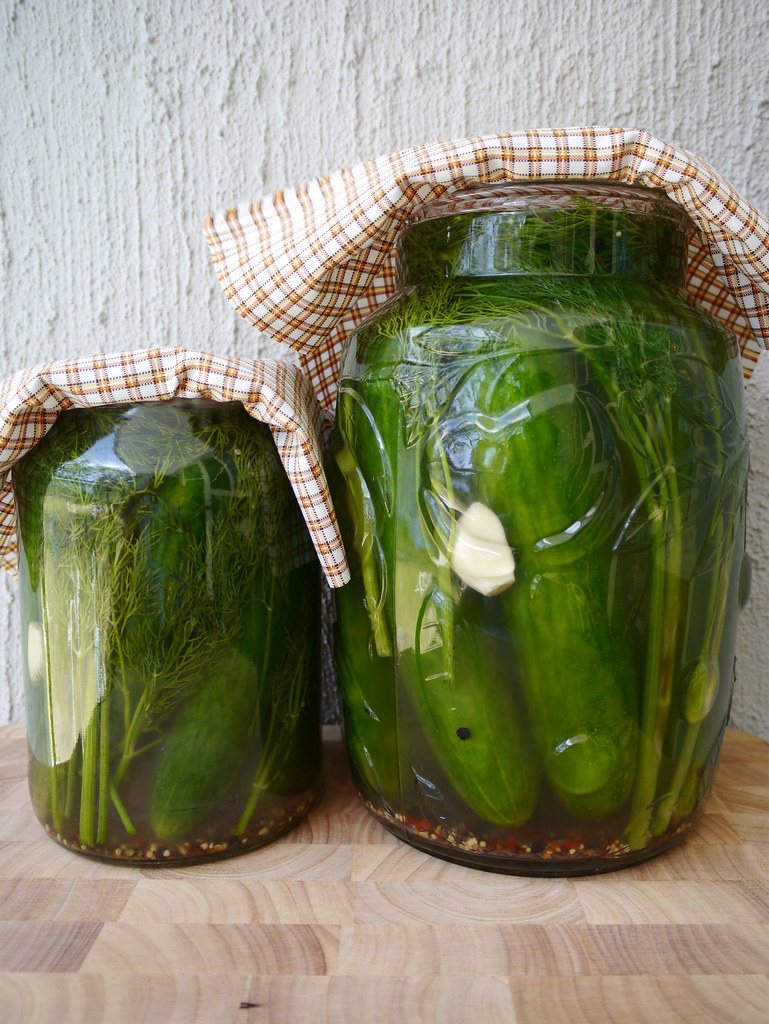
Note: Please use pickling cucumbers and non-chlorinated water to ensure your pickles turn out right. Please read Meredith Schultz’s comment at the end of this post for more info.
~
[dropcap]With[/dropcap] Christmas just around the corner, it’s inevitable that we start to think about presents – for ourselves and for others. Other than socks and the like, food glorious food, also make great/popular gift ideas for family and friends – and homemade/homegrown stuff are always the best – they’re more special, and more loved/appreciated.
Regarding homemade goodies – not only are they a fun/smart way to utilize seasonal produce – they’re also a lot tastier because they’re made with l-o-v-e, and more special too because often – the cook(s) will give their unique twist/spin to the recipe – an extra pinch/splash of that secret ingredient – spice/sauce/spirit, perhaps – you get my drift.
You might know by now that I’m a huge/massive fan of pickled/preserved food – from padaek to sauerkraut, pickled onions to salted duck eggs (and even jeow bong – even if it’s not really pickled). What I love the most about pickled food is its “aged/matured flavour/character” and often high salt content. I know – I know – but a man’s got to live a little – and I do try to practice control and moderation as best as I can.
A couple of nights ago, as I was catching up on my food literature (blog) readings via Aussie Food Bloggers, I landed on Lambs Ear and Honey’s recent post which mentioned HotelClub’s post on Australia’s top food blogs of 2014 (congratulations to all the food blogs on the post btw!). On the post, I read Cyn’s (The Food Pornographer) answer to the hottest cuisine of 2014/2015, which included – “American-style barbecue and burgers (complete with giant pickles)”.((1))
Being a pickle fan, the mention of giant pickles made my eyes light up, and I was immediately intrigued and inspired to make this classic pickle of mammoth proportions.
Pickled cucumbers, aka gherkins, or cornichons, or simply “pickles” are one of the most popular types of pickled foods. So popular, that in the U.S. and Canada, the word “pickle” alone almost always refers to a pickled cucumber.((2))
Pickles come in all shapes and sizes (and styles) – and can be found commercially as “cute as a button” cocktail pickles/cornichons, crinkle-cut sweet bread & butter pickles, or more fuller/rounder ones – and now, as I would like to share with you – giant dill pickles too.
Standard pickles are made from a particular species of cucumber – the West Indian or Burr Gherkin (Cucumis anguria), which produces a somewhat smaller fruit than the regular garden cucumber (Cucumis sativus).((3)) Proper pickling cucumbers aren’t easy to come by, and if you’re anything like me whereby sometimes – a cucumber is a cucumber – you’d understand that it makes sense to use the more readily available and still so delicious Lebanese cucumbers to make pickles with instead.
The cucumbers/pickles in this recipe might not win first prize in the giant pickle competition (especially when compared to the pickle pictured below) – but they’re still pretty impressive in size compared to most typical commercial varieties.
Also, when selecting the cucumbers at the store, I had to take into account that they had to fit inside the jars, so the longer Telegraph cucumbers were out of the question if I wanted to keep them whole. Home-grown/heirloom varieties would work perfectly in this recipe also.
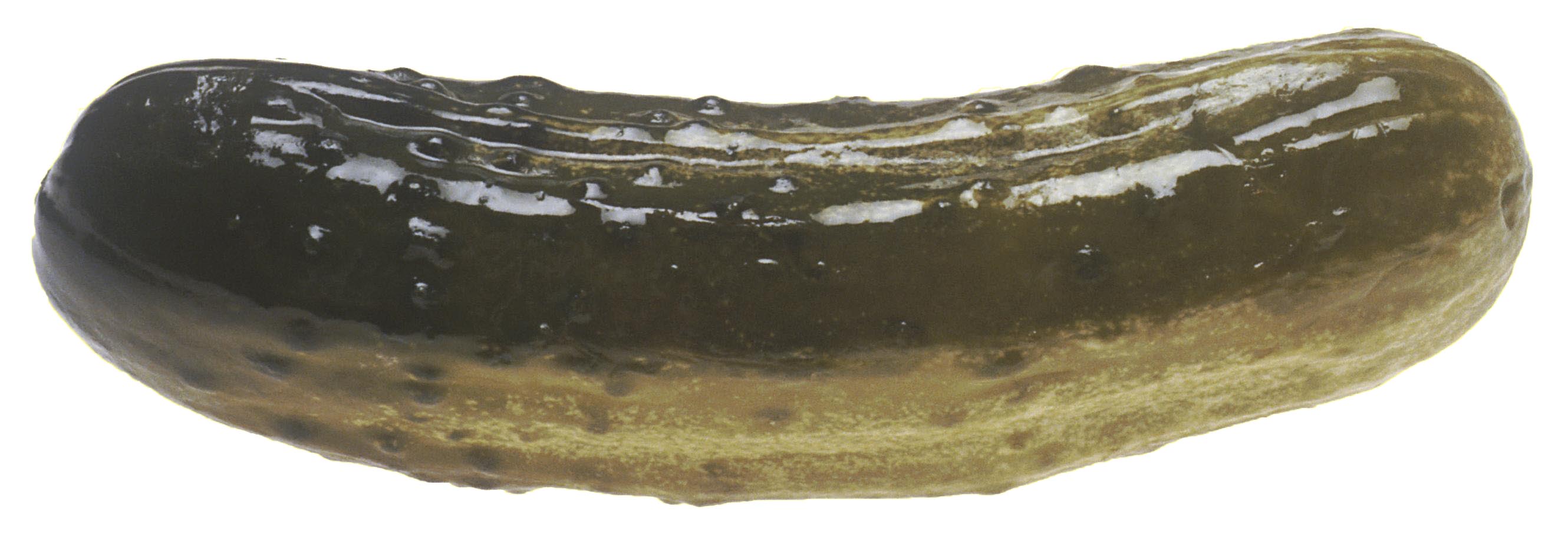
The recipe below is adapted from the “kosher” dill pickle recipes provided by David Lebovitz (adapted from Arthur Schwartz’s Jewish Home Cooking) and Cultures for Health. Both recipes are quite similar to each other, and as usual, I added a few alterations to give it my twist. Specifically – I’ve used my own pickling spice mix, which include chili flakes and kaffir lime leaves, which were wasting away in the fridge.
It is interesting to note that “kosher” dill pickles are not necessarily kosher in the sense that they’ve prepared in accordance with Jewish dietary law. Instead – they’ve been made in the traditional manner of Jewish New York City pickle makers – with the generous addition of garlic and dill to a natural salt brine.((5))
Because I’ve added a few extra ingredients to the pickling solution, I’m not sure if my recipe still fits in with the “kosher” definition, so I’ve omitted this term from the title. Instead, I’m happy to simply call this recipe – “whole lacto-fermented pickled Lebanese cucumbers”, or “giant dill pickles – ala Padaek”.
Like other lacto-fermented foods – these pickles are rich in probiotics. Not only are they crispy, crunchy and deliciously addictive (not to mention OMG so easy to make) – they’re also excellent for your inner/gut health. The flavour is distinctively different to vinegar pickles, and if you love sour food/snacks (like I do) – these dill pickles are a great option for you.
They will keep well in the fridge and make great appetizers/snacks or accompaniments with meats, sandwiches/burgers, etc. They also make great gifts for all occasions, including Christmas. So what are you waiting for? And while you’re there, consider making extra to share them with your family and friends for Christmas lunch. Also, if you love fried food – pickles can also be battered and fried, which I’ve not yet tried but am now very keen to try!
Before I sign off – I just want to say thank you to all the people/links I’ve mentioned above for the inspiration and guidance with this recipe. Also, talking about Christmas – if you don’t visit this site before Christmas day – I hope you have a very merry one!
And last but not least, for quiz night – the term “pickle” is derived from the Dutch word “pekel”, meaning brine.((6)) Sweet!
Note: Stay tuned for the update post in about 3-7 days time!
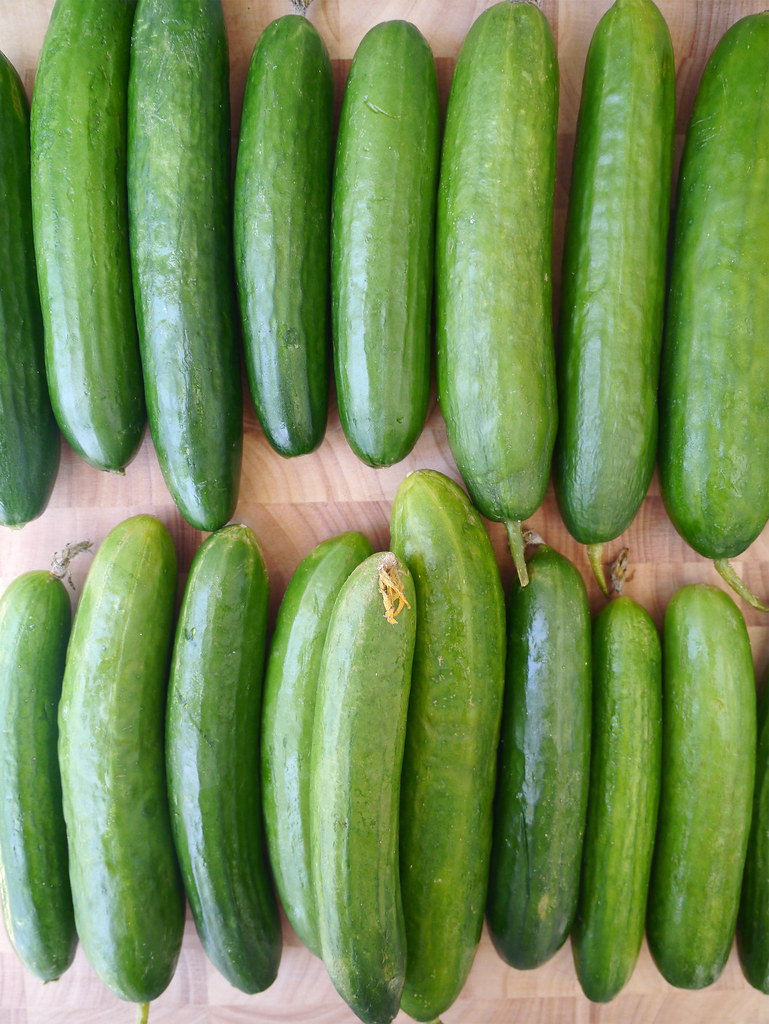

The pickling spice mix that I used include: 1 tsp of whole black peppercorns, 1 tsp of coriander seeds, 1 tsp on yellow mustard seeds, 1 tsp of allspice (pimento), 1 tsp of caraway seeds, 4 star anise, 1 tsp of chili flakes. Also, 10 bay leaves and 10 kaffir lime leaves.

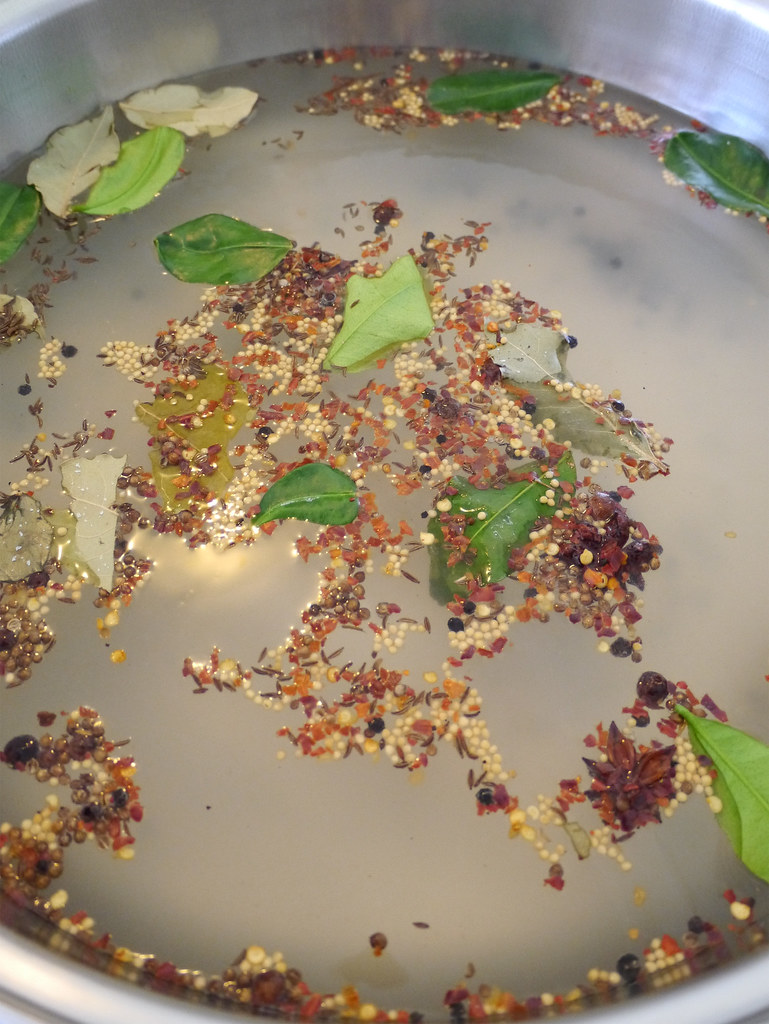
In a saucepan, bring 4 litres of non-chlorinated water to the boil. Add the sea salt and the pickling spices (do not add the garlic cloves or dill) and stir until the salt has fully dissolved. Let the solution cool down completely.
Note: Some pickle recipes that I’ve read advise to use dechlorinated/filtered/etc. water to make pickles with. Seeing that the water will be boiled anyway, I decided to simply/just use tap water. I hope it will work fine. I think it should fine. In fact, I’m starting to think that using anything other than tap water to make pickles with is starting to sound like a first world dilemma! Update 22/08/16: Please use non-chlorinated water.

Gently wash and scrub the cucumber clean.

Cut off the stems and put aside.


Peel the garlic cloves and trim the roots.
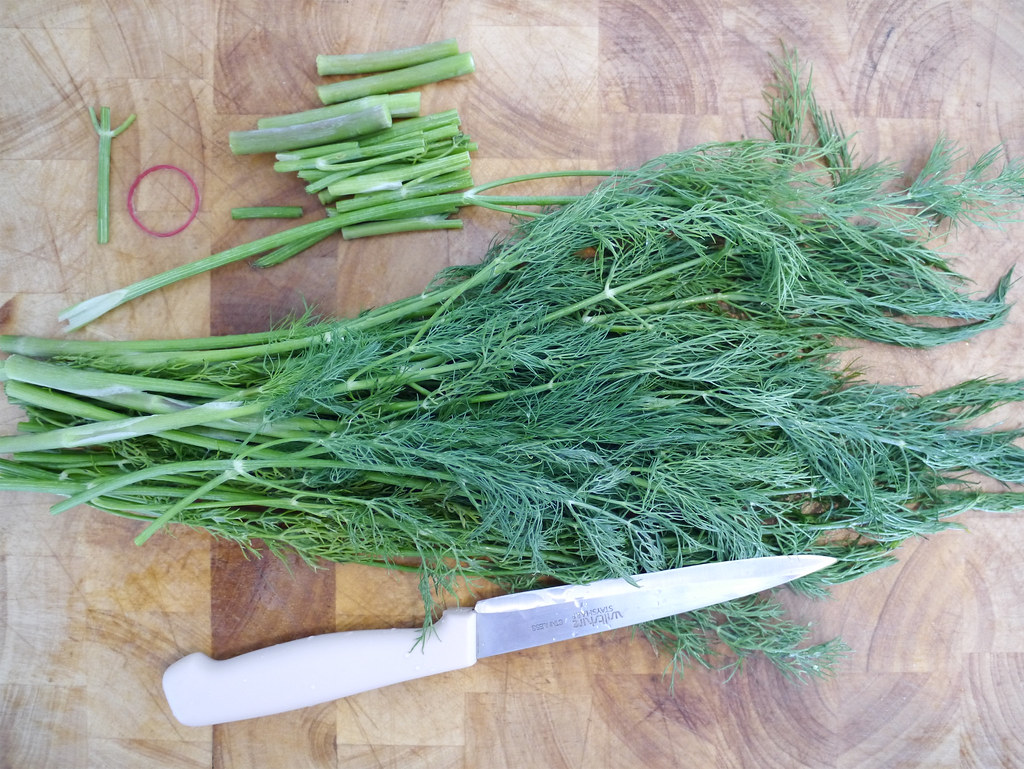
Wash the dill and trim the stem tips.
Note: Dill fronds/flowers are recommended to make dill pickles with (they look very pretty), but I couldn’t find any. Ordinary dill leaves like above will work just fine.
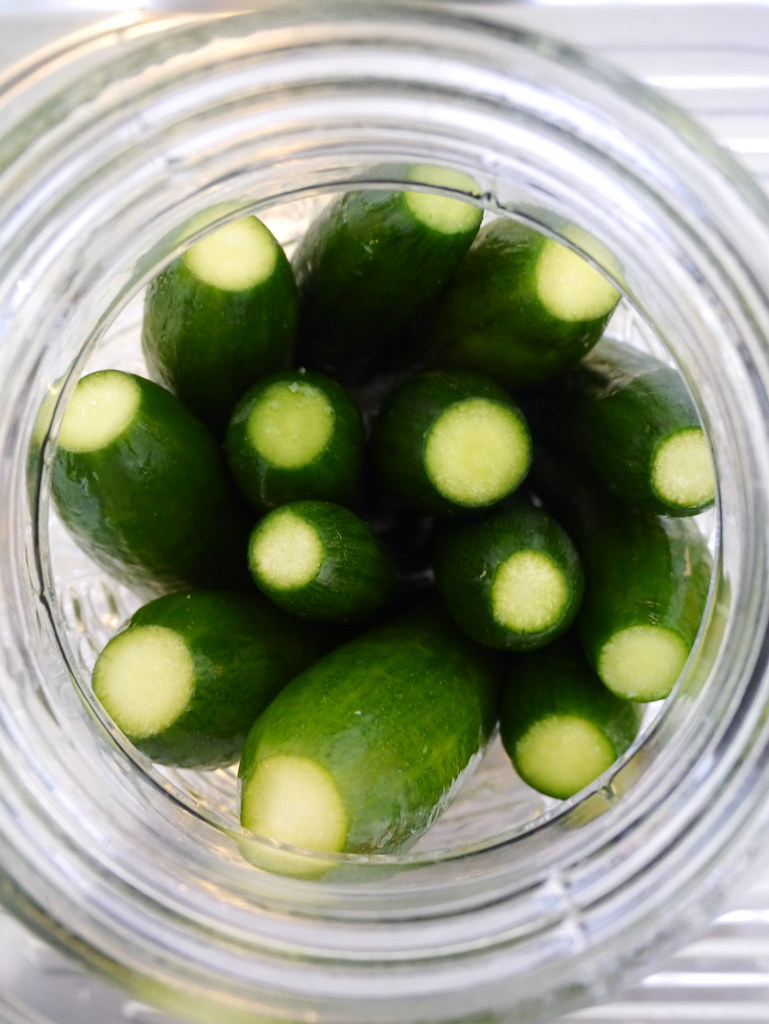
In a large clean/sterilized glass jar, pack in the cucumbers vertically, neatly and tightly.


Evenly place in the garlic cloves.

Evenly place in the dill.
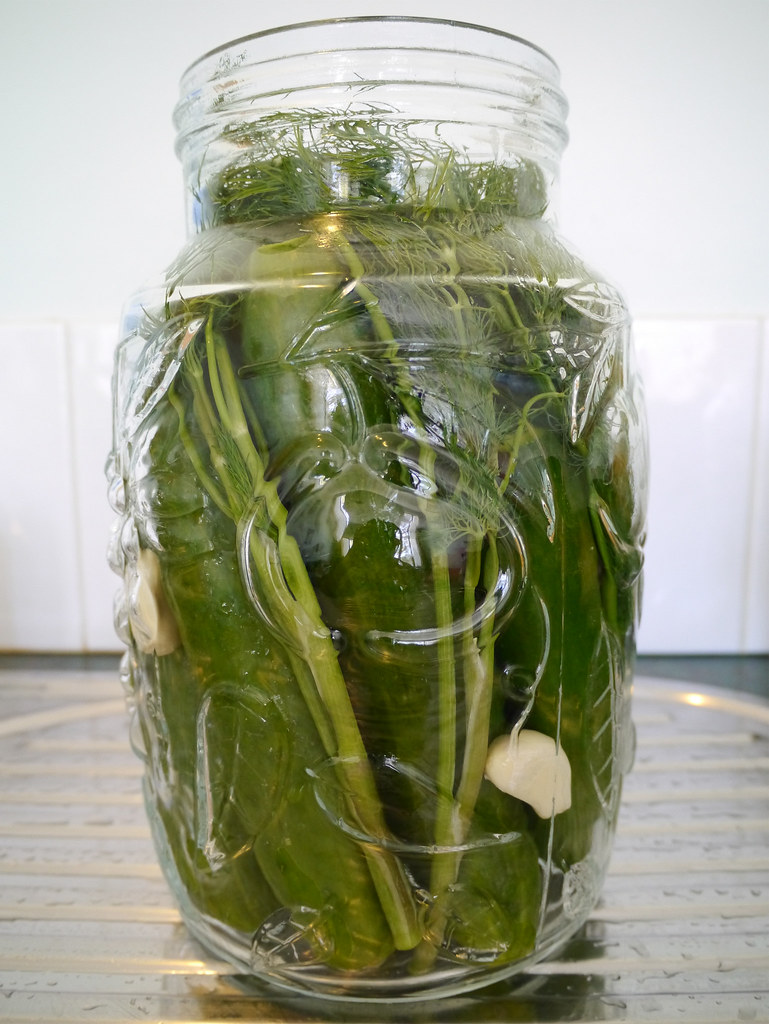

When the pickling solution has cooled down completely, carefully pour it into the glass jar to cover the cucumbers completely. Leave about 3 cm head space.


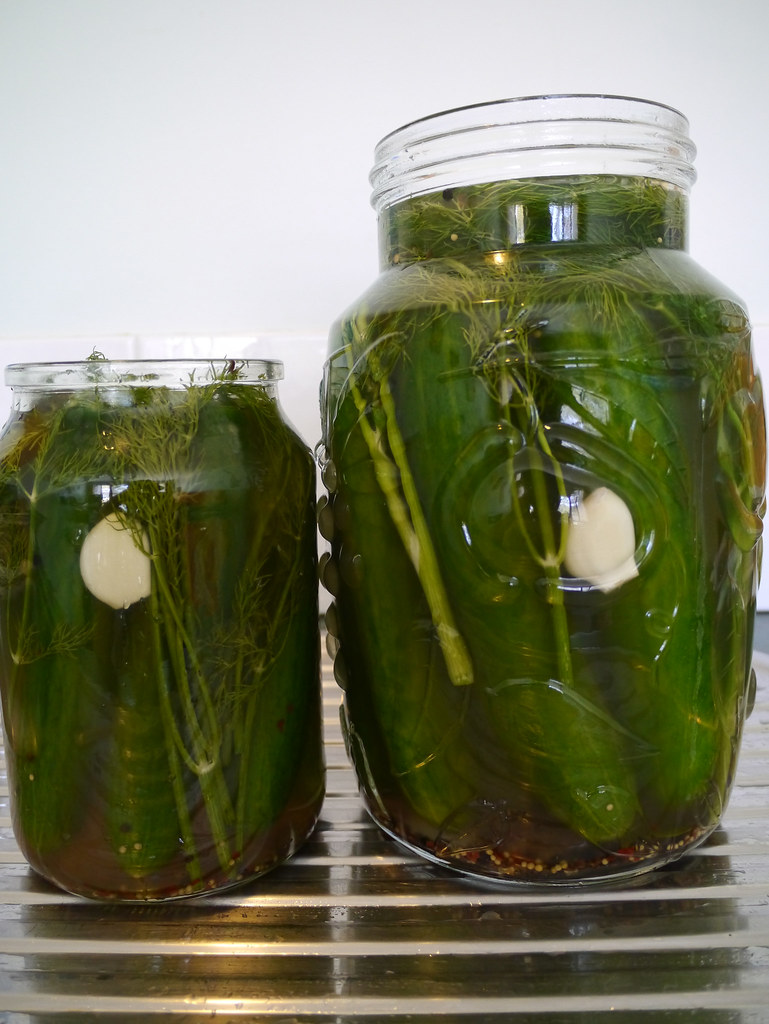

Cover the mouth of the jar with a clean cotton cloth and secure with a rubber band. Store in a cool, dark place and let the pickles ferment for 3-6 days. After 3 days, taste one of the pickles to see if it is sour enough. The longer you let them ferment, the more sour they will become. When the pickles have reached the flavour that you’re happy with, transfer them into smaller jars with resealable lids and place them in the fridge, ready for eating. Serve the dill pickles as a snack or starter, or with your favourite meaty dishes, etc. Bon appetit and Merry Christmas!bigsmile
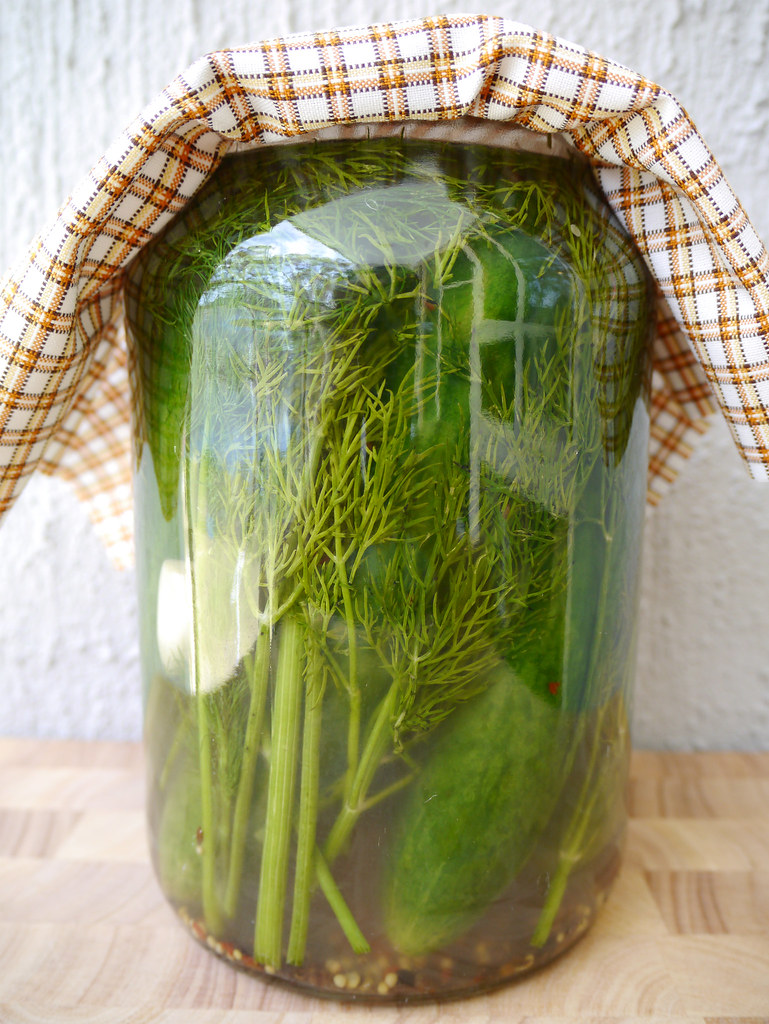
- 2 kg of Lebanese cucumber (or any type of cucumber of manageable size)
- 4 litres of non-chlorinated water
- pickling spices (I used 1 tsp of whole black peppercorns, 1 tsp of coriander seeds, 1 tsp on yellow mustard seeds, 1 tsp of allspice (pimento), 1 tsp of caraway seeds, 4 star anise and 1 tsp of chili flakes)
- 10 bay leaves
- 10 kaffir lime leaves
- 6 TBSP of sea salt
- 1 garlic head (about 10 garlic cloves)
- 1 bunch of dill
- In a saucepan, bring 4 litres of non-chlorinated water to the boil. Add the sea salt and the pickling spices (do not add the garlic cloves or dill) and stir until the salt has fully dissolved. Let the solution cool down completely.
- Gently wash and scrub the cucumber clean.
- Cut off the stems and put aside.
- Peel the garlic cloves and trim the roots.
- Wash the dill and trim the stem tips.
- In a large clean/sterilized glass jar, pack in the cucumbers vertically, neatly and tightly.
- Evenly place in the garlic cloves.
- Evenly place in the dill.
- When the pickling solution has cooled down completely, carefully pour it into the glass jar to cover the cucumbers completely. Leave about 3 cm head space.
- Cover the mouth of the jar with a clean cotton cloth and secure with a rubber band.
- Store in a cool, dark place and let the pickles ferment for 3-6 days.
- After 3 days, taste one of the pickles to see if it is sour enough. The longer you let them ferment, the more sour they will become. When the pickles have reached the flavour that you’re happy with, transfer them into smaller jars with resealable lids and place them in the fridge, ready for eating. Serve the dill pickles as a snack or starter, or with your favourite meaty dishes, etc. Bon appetit and Merry Christmas!bigsmile
[[1]]Reference: http://www.hotelclub.com/blog/australias-top-food-bloggers-of-2014/.[[1]]
[[2]]Reference: http://en.wikipedia.org/wiki/Pickled_cucumber.[[2]]
[[3]]Reference: http://en.wikipedia.org/wiki/Pickled_cucumber.[[3]]
[[4]]Image Source: Wikimedia Commons. Description: “a large, whole, deli pickle”. Date: 1994. Author: Renee Comet (photographer). Licensing: Public Domain.[[4]]
[[5]]Reference: http://en.wikipedia.org/wiki/Pickled_cucumber.[[5]]
[[6]]Reference: http://en.wikipedia.org/wiki/Pickled_cucumber.[[6]]

I didn’t know the origin of the word pickle but now I’m totally armed for our next trivia night!
Hi Helen,
Thank you for your comment. The world of pickles is another amazing/fascinating one and there’s so much to know including facts like this. Great trivia question I reckon. Btw, congratulations on the HotelClub’s Best Sydney Food Blog! Excellent photo too. Best wishes! :D
Wow – those are some serious pickles! Lovely photo’s guiding the novice pickler here, too.
Hi lambsearsandhoney,
Thank you fro your visit and comment. These giant pickles do look impressive and I can’t wait to try them. I hope they turn out good. Thanks for the kind words on the photos. Congratulations on Best Adelaide Food Blog too. I really enjoy following/reading your blog. Best wishes! :)
Well, having been born right in the middle of the pickled cucumber eating areas in Northern Europe and having enjoyed them lifelong from early babyhood methinks we may perhaps have to disagree on a few matters. Gherkins, cornichons and bread-and-butter cucumbers have little to do with a ‘proper’ dilled cucumber’ as eaten all over Eastern and Northern Europe and much of the Jewish diaspora [well, they are all forms of cucumber!!] , especially the Polish one: indeed most of us in the Baltic diaspora now usually access the socalled ‘Polish Cucumbers’. These are very much more simply made and [big smile] I don’t think yours would be considered quite ‘Kosher’!! Also the size of a dilled cucumber is pretty definite: don’t have a tape here but they are always even at about 6-7 cms. Am certain yours are lovely and certainly different, but perchance I’ll keep the traditional one :) !!!
Hi Eha,
Thanks for your comment. I’m fascinated by a lot of the excellent food that come from that area and look forward to exploring/learning more about it. You’re right – dill pickles are unique and distinctively different to the other types of pickled cucumbers mentioned above. The only similarity they share is that they’re all “pickled cucumbers”. Thanks for sharing the info on the Polish ones. It’s something I’ll like to give a go at making sometime. Yes – although inspired by “kosher” recipe, these giant ones aren’t because of the extra ingredients, etc. The typical dill pickles are fun/easy to eat whole compared to these mammoths ones, lol. Most likely, they’ll need to be sliced up/quartered, or eaten like a dagwood dog or fried, we’ll see. They are a conversation starter and I can’t wait to try them. An option for the more brutish. :)
You are so right about the ‘dills’! A lot of the guys, a glass of vodka in one hand and a whole dill in the other stand right over the sink [like we do with mangoes ;) !] to eat them whole. But they are hardly ever sliced, more usually quartered lengthwise as a side. So traditionally smaller: I remember cucumbers being specifically grown for dills! By the way I do believe ‘dill pickle’ is more of an American term . . . . if one were to translate jar labels from a dozen different languages up north and east they would all say ‘sour cucumbers’ – sounds peculiar but is IS ‘sauerkraut’ ie, sour cabbage is it not :) ? Don’t think we regard them as a pickle!!!
Dill pickles and vodka. Now that sounds like a great idea! Food/recipe naming can get confusing. Brined cucumbers are usually sour, so sour cucumbers makes sense and when dill are used, then dill pickles. Sometimes a conversation to elaborate and a picture helps. I’m sure they all taste amazing and do the same job, lol. I think I’ll end up quartering these lengthways too. The dill/aromatic perfume permeating is amazing! Best wishes! :D
Wow, what an army of spices used in this pickle recipe! I can just imagine how great this tastes! Thanks so much for sharing, Padaek!!!
Julie & Alesah
Gourmet Getaways xx
Hi Julie & Alesah,
Thanks for your comment. I initially wanted to use a store bought packet of pickling spice mix, but the shop didn’t have it, so I just put something I had at hand together. Every time I walk past the jars and smell the covered lids, the aromatics/perfume just smells so amazing. I want to bottle it. Well, I think I kind of have in a way. Can’t wait to taste them when they’re ready. Will probably take longer because of their size. Best wishes! :D
Oh, this recipe speaks to my heart. I absolutely love any pickled vegetables, but especially cucumbers and sour little fruits. When I die, I want to go eat a whole gigantic jar of pickles, the spicier, the better.
Hi Noony!
Thank you for your comment. I love sour food/pickles/”dorng” too, and I think you’ll love these behemoth pickles. They’re starting to change colour already and I can’t wait to eat them. Good thing I kept them whole because I think they go a little soggy when sliced/quartered before pickling. Pickled fruit (mark nyoom, etc.) and jeow is so tasty. Hopefully, I can get some sour plums and I’ll do a similar pickle to share. Best wishes! :D
Awesome Padaek! I made some from the Boston pickling cucumbers I grew in the garden with a similar recipe.
Thanks Jem!
That sounds awesome. The Boston pickling cucumbers sound perfect. Looking froward to growing and pickling some home grown veg/cukes soon. No greater joy. Will be heading over to your blog for some gardening advice. I can’t wait to try these ones. Best thing about home pickling is adding our own fav herbs/spices. Best wishes! :D